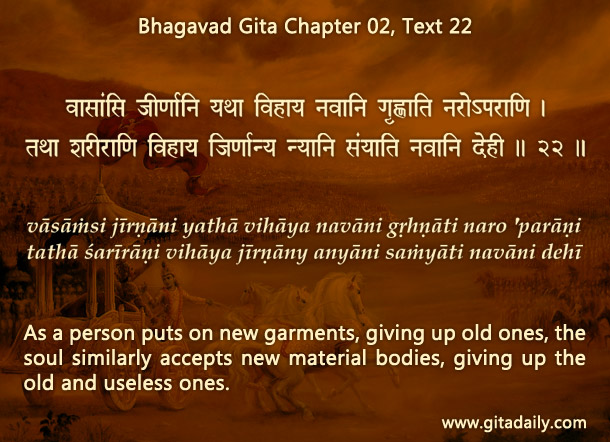When anything good ends, we often feel sad, “Why did this have to end?” Conventional wisdom reminds us that endings are also beginnings.
Expounding this two-faced nature of transitions, the Bhagavad-gita illumines it with spiritual light. It explains that we are eternal souls, parts of Krishna; and we are on a multi-lifetime journey of spiritual evolution in which death is the beginning of a new phase. By comparing our physical bodies to dresses, it (02.22) shifts our focus when we contemplate death – we focus not on the old body we will lose, but the new body we will acquire. What body will we get? If we practice bhakti-yoga diligently, we get, after death, an eternal spiritual body, or at least a better material body favorable for spiritual growth.
What if we haven’t practiced bhakti-yoga in this lifetime? Still, wherever we go after death as per our karma, our eternal Lord, in his immanent manifestation, will accompany us and there prompt us to practice bhakti. Thus, a fresh opportunity to hear his promptings makes that beginning auspicious too.
The principle that endings are also beginnings applies to life’s phases too. For example, when a spiritually inspiring retreat ends, the opportunity to apply what we have learnt begins. By embracing that opportunity, we experience the inclusiveness of bhakti. When we strive to serve Krishna even in non-spiritual settings, we increasingly sense his all-pervading presence. We realize that his remembrance can enrich us not just in a serene retreat but also in daily life’s rough-and-tough.
By thus meditating on both the cyclic nature of material existence and the enduring nature of our devotional connection with Krishna, we can see every ending as a beginning. And by looking for the opportunities latent in the transition, we can progress towards relishing supreme spiritual happiness as his blissful parts.
To know more about this verse, please click on the image
Explanation of article:
Podcast:


The process of “Beginning” and “Ending” , must lead us to Krishna’s
“Yadgatva na nivartante
Ta dham parmam mam:”
Jai shree Krishna ,Prabhu ji